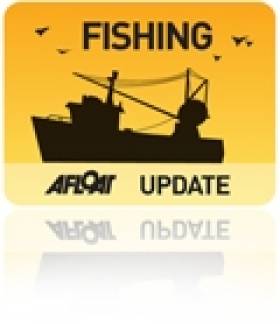Displaying items by tag: Dr. Steve Murawski
Former Obama Adviser sees a "Rebirth" in the Use of Industry Information to Guide Scientists
Dr. Peter Heffernan (Marine Institute) with Martin Pastoors (IMARES, The Netherlands) and Dr. Steve Murawski (NOAA, USA) at the Conference. (Photo: Marine Institute).
The Conference - "Fisheries Independent Information, Galway 2010" – not only explores how information gathered at sea by fishermen can better contribute to fish stock assessments, management and policy but critically, how the vast amount of experience and traditional knowledge accumulated by the fishing industry can be harnessed in sustainable management strategies.
Speaking on the first day of the event Dr. Steve Morawski, former senior advisor for the National Oceanic and Atmospheric Administration to President Obama's Ocean Policy Task Force and the current Chief Science Advisor to NOAA Fisheries, USA said that in spite of past concerns regarding the reliability of fishery-dependent data, we are in the midst of a "rebirth" in the use of information from industry to inform stock assessment and the management of catch and by-catch allowances.
"Fortunately, great advances have been made in methods for collection and analysis of fishery-dependent data and we have experienced encouraging success in working with stakeholders to collect this type of data," he said.
Some 30 countries from across the globe are represented at the conference, which features 81 oral presentations and 50 poster displays covering the entire spectrum of fishing, from small scale artisinal fisheries right up to large scale industrial operations engaged across the world's oceans and inland waters.
Opening the conference, Dr. Peter Heffernan of the Marine Institute said that, while Ireland had made significant progress in bringing scientists and fishers together through the formation of the Irish Fisheries Science Partnership, he was keen to learn how such initiatives had worked elsewhere and what we could learn from others. "Innovation is the key element to this conference," he said, "technical innovation in the development of new data collection tools and data integration, but also through innovative thinking and co-operation in how we can marry together traditional and non-traditional information."
According to the International Labour Organisation (ILO) the capture fishing industry employs some 27 million people worldwide (including full-time, part-time and occasional fishers). In Europe, the European Commission estimates that some 141,000 people are employed in the fishing sector which produces over 6.5 million tonnes of fish between the catching and aquaculture industries.
"Fishermen and scientists have an enormous amount that they can contribute to each other," said Lorcan O'Cinneide, CEO of the Irish Fish Producers Organisation in his keynote address earlier today (Tuesday 24th August). "It is essential for the future that the integration of such information can be brought to the centre of the scientific and advice process in a manner that has the necessary rigour to be credible and useful to analysis."
Marine and inland fisheries are of particular importance to developing countries where ILO estimates that over 94% of the world's fishers live (Asia 83%, Africa 9% and South America 2.5%). In these countries fish is not only an important source of protein for many communities, but also an important part of global trade. The role that fishers and their knowledge play in ensuring a sustainable "ecosystem approach" to commercial fishing by artisinal and small-scale fishworkers the world over will be discussed during the last day of the Conference (Thursday 26th) by Sebastian Mathew of the International Collective in Support of Fishworkers (ICSF).
The conclusion of his paper will suggest that sustainability in fisheries depends upon seeking common ground between fisheries policy, scientific knowledge and fishers' knowledge and practice. He will also suggest that the key to sustainable fisheries management lies in treating fishers' knowledge with respect and by promoting active communication amongst stakeholders.






























































